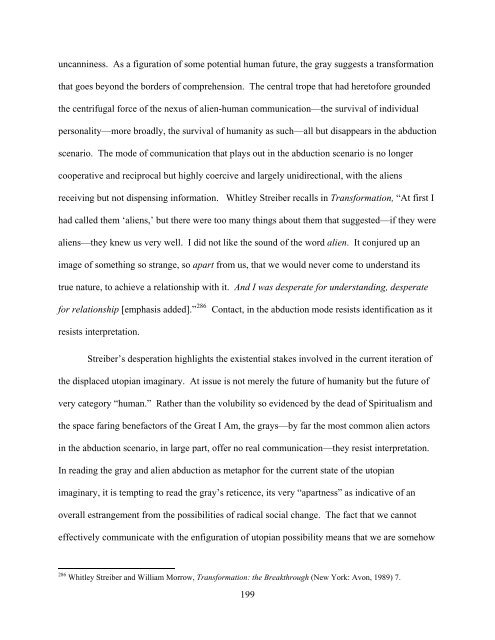A Genealogy of the Extraterrestrial in American Culture
A Genealogy of the Extraterrestrial in American Culture
A Genealogy of the Extraterrestrial in American Culture
Create successful ePaper yourself
Turn your PDF publications into a flip-book with our unique Google optimized e-Paper software.
uncann<strong>in</strong>ess. As a figuration <strong>of</strong> some potential human future, <strong>the</strong> gray suggests a transformation<br />
that goes beyond <strong>the</strong> borders <strong>of</strong> comprehension. The central trope that had heret<strong>of</strong>ore grounded<br />
<strong>the</strong> centrifugal force <strong>of</strong> <strong>the</strong> nexus <strong>of</strong> alien-human communication—<strong>the</strong> survival <strong>of</strong> <strong>in</strong>dividual<br />
personality—more broadly, <strong>the</strong> survival <strong>of</strong> humanity as such—all but disappears <strong>in</strong> <strong>the</strong> abduction<br />
scenario. The mode <strong>of</strong> communication that plays out <strong>in</strong> <strong>the</strong> abduction scenario is no longer<br />
cooperative and reciprocal but highly coercive and largely unidirectional, with <strong>the</strong> aliens<br />
receiv<strong>in</strong>g but not dispens<strong>in</strong>g <strong>in</strong>formation. Whitley Streiber recalls <strong>in</strong> Transformation, “At first I<br />
had called <strong>the</strong>m ‘aliens,’ but <strong>the</strong>re were too many th<strong>in</strong>gs about <strong>the</strong>m that suggested—if <strong>the</strong>y were<br />
aliens—<strong>the</strong>y knew us very well. I did not like <strong>the</strong> sound <strong>of</strong> <strong>the</strong> word alien. It conjured up an<br />
image <strong>of</strong> someth<strong>in</strong>g so strange, so apart from us, that we would never come to understand its<br />
true nature, to achieve a relationship with it. And I was desperate for understand<strong>in</strong>g, desperate<br />
for relationship [emphasis added].” 286<br />
Contact, <strong>in</strong> <strong>the</strong> abduction mode resists identification as it<br />
resists <strong>in</strong>terpretation.<br />
Streiber’s desperation highlights <strong>the</strong> existential stakes <strong>in</strong>volved <strong>in</strong> <strong>the</strong> current iteration <strong>of</strong><br />
<strong>the</strong> displaced utopian imag<strong>in</strong>ary. At issue is not merely <strong>the</strong> future <strong>of</strong> humanity but <strong>the</strong> future <strong>of</strong><br />
very category “human.” Ra<strong>the</strong>r than <strong>the</strong> volubility so evidenced by <strong>the</strong> dead <strong>of</strong> Spiritualism and<br />
<strong>the</strong> space far<strong>in</strong>g benefactors <strong>of</strong> <strong>the</strong> Great I Am, <strong>the</strong> grays—by far <strong>the</strong> most common alien actors<br />
<strong>in</strong> <strong>the</strong> abduction scenario, <strong>in</strong> large part, <strong>of</strong>fer no real communication—<strong>the</strong>y resist <strong>in</strong>terpretation.<br />
In read<strong>in</strong>g <strong>the</strong> gray and alien abduction as metaphor for <strong>the</strong> current state <strong>of</strong> <strong>the</strong> utopian<br />
imag<strong>in</strong>ary, it is tempt<strong>in</strong>g to read <strong>the</strong> gray’s reticence, its very “apartness” as <strong>in</strong>dicative <strong>of</strong> an<br />
overall estrangement from <strong>the</strong> possibilities <strong>of</strong> radical social change. The fact that we cannot<br />
effectively communicate with <strong>the</strong> enfiguration <strong>of</strong> utopian possibility means that we are somehow<br />
286 Whitley Streiber and William Morrow, Transformation: <strong>the</strong> Breakthrough (New York: Avon, 1989) 7.<br />
199















